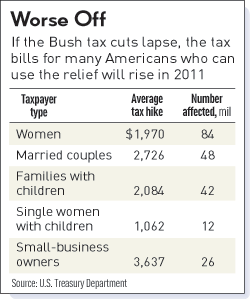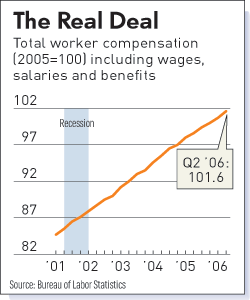Posted 8/30/2006
Tax Policy: The myth lives on: Bush's tax cuts boosted the rich and gypped the poor and middle class. So let's see how the poor and middle class fare without them.
The Treasury Department issued a news release last week that clearly shows that the very people the Democrats and the mainstream media purport to be so concerned about in their opposition to tax relief will see their tax bills go up if the tax cuts are not made permanent.
"More than 5 million low-income individuals and couples will no longer be exempt from individual income tax," said the release.
Compare the government's sober analysis to these wild-eyed statements from prominent Democrats:
• Tom Daschle, the one-time Senate Democratic leader who was voted out of office, predicted in February 2003 that the Bush tax cuts would have "no real benefits on most American families."
• "The poor suffer. The rich benefit. The middle class pays the bill," House Democratic Leader Nancy Pelosi said last year during debate on a small ($56 billion) tax cut.
• "Is it justice to steal from the middle class to give tax cuts to the ultrasuper rich?" Pelosi asked in January 2003 during an earlier round of debates.
• "Their tax cut plans put the wealthy first," Rep. Charles Rangel, who would be chairman of the House Ways and Means Committee if that chamber falls to the Democrats in November, said of the Republicans in 2003.
• "His entire first eight months was tax cuts for the rich, tax cuts for the rich, tax cuts for the rich, and he lied and said the tax cuts would help average Americans," columnist Molly Ivins, a Texan who holds a blinding hatred for the Bush family and has an exceptional love for class warfare, wrote in 2003.
Who's lying now? According to the Treasury Department, a family of four with two children making $56,300 in 2011 — that's not rich — will be hit with a tax bill that's bigger by $2,092, a 132% hike.
That same family making $67,600 a year — still not rich — would see its tax bill go up by $1,858, an increase of 58%.
(See the accompanying table to see who else would be hurt by the tax hike that would follow failure to make the tax cuts permanent.)

The untold story of the Bush tax cuts is the fact that they wiped millions of poor and low-income Americans off the income tax rolls. A large block went from paying small tax bills to paying no income taxes at all. As many as 43 million Americans, nearly a third of all taxpayers, now have no income tax liability.
Why didn't we hear this when all the squawking was about the rich getting big tax cuts while the poor and middle class were given small tokens? Why aren't we hearing it now, when Congress could get to work on continuing tax relief for so many who could use it?
The reflexive opposition to tax cuts by most Democrats and their media allies and their eagerness to incite jealousy among economic classes are as harmful as they are outdated.
